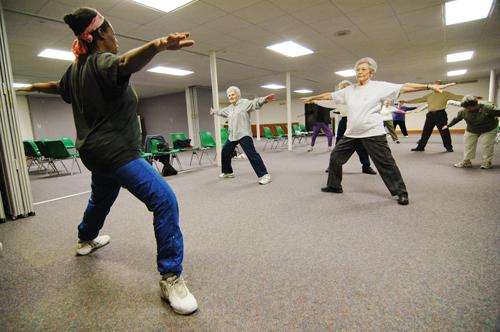Community promotes wellness through new programming
Feb 1, 2007
At the First United Methodist Church in Champaign, doctors, pastors and volunteers have constructed a wellness center that is home to a variety of health-related programs. Through options like exercise classes and memory therapy, this congregation is receiving what many might not expect a religious organization to offer.
Religious organizations are increasingly including activities and events to build a community around the basic concept of faith. Adding social, educational and health-related components to a religious institution can strengthen group ties and help in attracting new members, said Sandy Burgener, employee of the College of Nursing, who began the wellness program at the First United Methodist Church.
Founded in 2001, the church originally only housed occasional classes. As enthusiasm grew for the program, the church got behind it, said Mary Brady, a staff member of the First United Methodist Church
“Early on, the project was very small, but (Sandy’s) passion and our interest brought this into the permanent wellness center it is today,” she said. “We are always interested in outreach and (Sandy) is one of our arms.”
The church is currently home to exercises classes, memory loss therapy sessions and support meetings for caretakers of people with memory loss. Exercise classes meet three times a week and are for members and nonmembers of the church alike. Classes have no set fee, but people who attend are encouraged to make donations.
Get The Daily Illini in your inbox!
The memory loss program, the only one of its kind in Central and Southern Illinois, receives patients from as far as Springfield, said Terry Harter, a pastor at the church.
“Those with Alzheimer’s disease or a milder form of memory loss really seem to benefit from our program,” he said. “We use exercise and other tactics to repair cognitive functions and group meetings to guide caretakers and open up the floor for discussion.”
In the near future, the wellness program will begin including pre-marital counseling, adolescent and children’s programs, retirement transition programs and more individualized support.
On campus, students often participate in religious or cultural organizations that offer both religious services and a social calendar. Illini Life (I-Life) is a Christian fellowship on campus that has an array of weekly meetings and annual events that are designed to reach out to the University student population.
Recently, I-Life has announced a new program called Home Fellowship, where students meet at each others’ houses on a regular basis. Julianne Atchison, junior in Education, has been involved in I-Life since she arrived at college.
“Every week we have Saturday Night Grace, where people are encouraged to bring friends,” said Atchison. “Beyond this seeker-friendly event, we also have a Home Fellowship in place. This is where we cook meals together and do more focused religious teaching.”
I-Life has four main yearly events including a volleyball tournament, a barn dance, a ski trip and a semi-formal, said Calvin Braker, sophomore in LAS.
“Members of I-Life informally hang out together or play sports,” he said. “Our social connections are very casual and often people from I-Life become roommates in a house together.”
The Hillel Foundation, a campus cultural organization for Jewish life, has similar social events planned for this semester. This foundation is home to religious services and classes for Jewish study, but also hosts many different social and cultural events each year.
Aliza Goodman, the Jewish Student Life coordinator of the campus Hillel, said this weekend the Hillel is having a Super Bowl party. In the coming month, Hillel is hosting a rock concert at the Canopy Club and an Alternative Spring Break trip to New Orleans to help with Hurricane Katrina relief efforts.
Hillel also sponsors many events in the University residence halls and is having its first Semi-Formal this semester, which will be Mardi Gras-themed.
“We consider Hillel a cultural organization, because for many, Judaism is more than a religion,” Goodman said. “For many it’s a great way to meet new people on campus or get involved with community service projects.”






